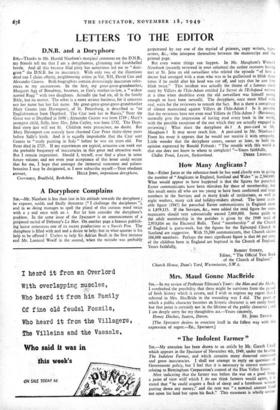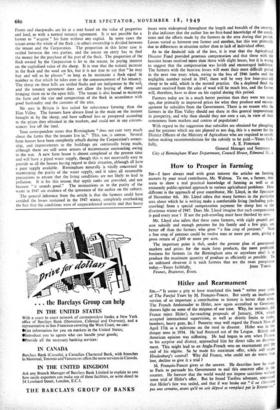44 The Indolent Farmer " SIR,—My attention has been drawn
to an article by Mr. Gareth Lima which appears in the Spectator of November 4th, 1949, under the heading The Indolent Farmer, and which contains many distorted statement' and gross inaccuracies. I shall not attempt to reply on questions of Government policy, but I feel that it is necessary to correct statements relating to Birmingham Corporation's control of the Elan Valley Estate. After indicating that the farmer was before the war on a good thing, a point of view with which I do not think farmers would agree, it is stated that "he could acquire a flock of sheep and a farmhouse without, putting down any money," and the rent was " a nominal amount NO not upon his land but upon his flock." This statement is wholly untrue.
Farms and shecpwallcs arc let at a rent based on the value of properties and land, as with a normal tenancy agreement. It is not possible for a farmer to " acquire " his farm without any capital. In some cases the tenant owns the whole of the flock ; in others ownership is divided between the tenant and the Corporation. The proportion in this latter case is settled between the two parties, and the tenant on entry has to find the money for the purchase of his part of the flock. The proportion of the flock owned by the Corporation is let to the tenant, he paying interest on the capitalised value of the sheep. It is true that the natural increase in the flock and the wool are his, but it is not true to say that " he may buy and sell as he pleases " so long as he maintains a flock equal in number to that which he takes over at the commencement of his tenancy. The sheep on these hills arc settled flocks and are indigenous to the soil, and the tenancy agreement does not allow the buying of sheep and bringing them on to the open hills. The tenant is also bound to maintain the farm and the size and composition of the flock in accordance with good husbandry and the customs of the area.
No area in Britain is less suited for subsistence farming than the Elan Valley. The farmers have always lived in the main on the income brought in by the sheep, and have suffered loss or prospered according to the prices they obtained in the markets, and could not in any circum- stances live off the land.
Your correspondent states that Birmingham " does not care very much about the farms that the tenants live in."- This, too, is untrue. Several farm houses have been completely rebuilt during the Corporation's owner- ship, and improvements to the buildings are continually being made, although there are still some arrears of maintenance outstanding owing to the war. A new farm house is almost completed at the present time and will have a piped water supply, though this is not necessarily easy to provide to all the houses having regard to their situation, although all have a pure supply available. Birmingham naturally is vitally concerned in maintaining the purity of the water supply, and it takes all reasonable precautions to ensure that the living conditions arc not likely to lead to pollution. It is for this reason that septic tanks are provided, and not because " it sounds good." The insinuations as to the purity of the water in 1947 are evidence of the ignorance of the author on the subject.
The general inference from the article is that the farmers could have avoided the losses sustained in the 1947 winter, completely overlooking the fact that the conditions were of unprecedented severity and that heavy losses were widespread throughout the length and breadth of the country. It also indicates that the author has no first-hand knowledge of the condi- tions and the efforts made by the farmers in the area during that period. Losses varied as between one farmer and another, but this was primarily due to differences in situation rather than to lack of individual effort.
As to the financial side of the loss, it is true that the Agricultural Disaster Fund provided generous compensation and that those with the heaviest losses received more than those with slight losses, but it is wrong to suggest that the compensation was lavish and encouraged indolence. The farmers with the heaviest losses will meet their most difficult period in the next two years when, owing to the loss of 1946 lambs and the negligible number raised in 1947, there will be very few four-year-old sheep to be sold, which is the normal practice. On a depleted flock the amount received from the sales of wool will be much less, and the farmer will, therefore, have to draw on his capital during this period.
Farmers today are in a much better position than they were ten years ago, due primarily to improved prices for what they produce and encour- agement by subsidies from the Government. There is no reason why the farmers in the Elan Valley should not share in this general improvement in prosperity, and why then should they not own a car, in view of their remoteness from markets and centres of population?
With regard to the suggestion that subsidies are obtained for ploughing and for potatoes which are not planted or not dug, this is a matter for the District Officers of the Ministry of Agriculture who are required to certify before making recommendations for the subsidy to be paid.—Yours faith- fully, A. E. FORDHAM
General Manager and Secretary.
City of Birmingham Water Department, Council House, Edmund St., 1.















































































 Previous page
Previous page